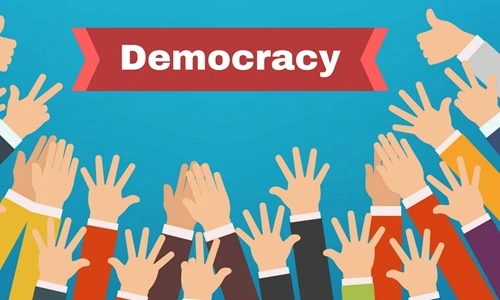Have you ever heard that democracy began in the 5th century BCE in Athens? Really? The system that ensures power is held by the actual population, or so the idea goes, not just those who hold it in their hands, is over 2,400 years old. Well, basically, yes. The word “Democracy” is derived from the Greek words demos (people) and kratos (power). It’s about the fact that everyone matters when it comes to how things are run, directly or through the people they choose to act as their collective leader. It guarantees that those in power listen to you, that they act on your needs, guaranteeing an equality of rights, freedom, and a recognition of individual freedoms and needs. Because of all this, democracy is an excellent idea, in fact, it’s everyone’s favorite way of running things. However, democracy is not without its flaws. It can be slow, inefficient, and susceptible to corruption and populism. Let’s know about the merits and demerits of Democracy:

Advantages of Democracy
1. You Pick, They Serve
In a democracy, it’s all about choice. In exchange for casting your vote for leaders to take care of the big stuff on your behalf, they are obliged to keep their promises, otherwise they won’t be in office for that long. This self-policing system means that those in power have every incentive to focus on making life better for all the people, with schools, hospitals, roads, and so forth. It’s more like a reality check that keeps everyone honest.
2. Everyone’s on the Same Page
Simply put, democracy is big on equality, that’s the whole concept here, right? You may be a prince, but you get the same voting share as everyone. The point of all this is fairness: no one is denied his or her rights because they are female or male, black or white, straight or gay. And when it comes to electoral politics, we have equal voices.
3. Keeping the Peace
One of the most important functions of democratic systems is that, when disagreements arise over how to solve problems, instead of reaching for fists, people converge on conversation, compromise, and voting processes. Not only does this enable the community to achieve some level of peace in the succession of disagreements, but it also builds community bonds and resilience to conflict by bringing disputes to a resolution short of all-out chaos.
4. Many Minds, Better Outcomes
If you put a bunch of different types of people in a room together, your plans are going to be of the sound type. Democracy lives on this mix. Because when decisions are required, all kinds of perspectives come to the table. Decisions become better, and so do results, because they tend to reflect what people need and want.
5. Stability and Legitimacy
Democracies are all about stability. Leaders get their time in the spotlight, but only for their term. Under such precise and reliably known rules, it is a lot easier for the government to begin to finish long-term plans for the betterment of the general public and the country as a whole. Furthermore, a government that is chosen by the voters is responsive to them simply because it gets its power directly from the thumbs of those voters, right?
Disadvantages of Democracy
1. When Winning Leads to Cheating
See, it is no hidden fact that electoral competition in democracies can lead to corruption, and we have seen it many times around the globe. Sure, politicians are tempted to do anything to win votes, including bribing voters or manufacturing votes through manipulation. This really calls the integrity of the democratic process into question, don’t you think?
2. Why So Slow, Democracy?
In a democratic government, when the decisions are important to make, they go through a lot of people’s approval before implementation. And this time period can be really long, like discussing the decisions over and over again, and only after being so sure, the action will be taken. So yes, is democracy often slow? Of course, it is. In emergencies in particular, when having an immediate answer to an acute situation is needed, such ineffectiveness can be extremely frustrating.
3. Incompetent Leadership
There are some challenging truths about democracy, one being that anyone can run for office and that sometimes includes people who maybe shouldn’t really. The consequence is a collection of about-average leaders and, in some cases, some very bad ones. Like, if in a country, people are thinking of their own benefit rather than the nation’s growth as a whole, they can very well elect a person who does not even have a vision for growth. This is one big problem with the concept of democracy.
4. Instability
Usually, in a democracy, one leader can stay in power for about 5 years, and unless he/she is elected in the next term, they will not be in power and all their vision will not be carried on by the upcoming leader or political party. This is the change that actually puts a dent in the overall growth of the country. If governments are regularly elected and replaced, and no-confidence votes are encouraged, few are likely able to maintain power long enough to bring change from the bottom up.
5. Potential for Misuse of Resources
See, for sure, the democratic process is an expensive one, but how? Well, you see, from elections to managing governance, it all takes a lot of effort and of course, money. The same funds could have been used in the development of the nation, to help out those in need. But what happens to that huge amount of money? Well, it gets shelled out like it is nothing.
6. Promotion of Populism
And yes, it is 100% true that democracy has a soft spot for populism. How? Well, leaders often end up making decisions based on what’s popular rather than what’s smart, and we bet you have seen political leaders doing that. Sure, this might win them applause and even elections, but at what cost? Yes, it costs the development and growth of the nation, which could have been faster, but it wouldn’t because of the so-called populism.
Quick Comparison Between Advantages and Disadvantages of Democracy
| Advantages | Disadvantages |
| Accountability through elections | Potential for electoral corruption |
| Equality in voting rights | Slow decision-making process |
| Encourages peaceful conflict resolution | Risk of incompetent leadership |
| Diverse perspectives improve outcomes | Frequent changes in leadership |
| Promotes stability and legitimacy | High costs and resource misuse |
| Tendency towards populism |


